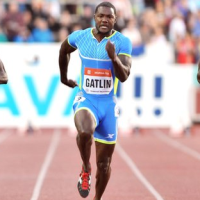Athletes Suspended for Steroid Use Stand to Benefit from the Drugs for Decades after Return to Sports
 Justlin Gatlin (AP photo)
Justlin Gatlin (AP photo)
If those operating international sporting events want to remove dopers and cheaters, they’re going to have to dish out much longer bans from competition, a new study shows.
Researchers in Norway say the effects of steroids can last long after athletes’ suspensions, even for decades. That’s problematic if the longest a competitor has to sit out is two years for his or her first offense.
Physiology professor Kristian Gundersen at the University of Oslo, who conducted the research last year, told BBC Sport: “I think it is likely that effects could be lifelong or at least lasting decades in humans.”
“Our data indicates the exclusion time of two years is far too short. Even four years is too short,” he said.
Some members of the track and field community point to Justin Gatlin, who won gold at the 2004 Summer Olympics, as an example of how an athlete, who was suspended for steroid use from 2006 to 2010, can still be enjoying the benefits of steroids. Gatlin, 32, has been burning up the track with times not usually seen by sprinters his age. He ran six of the seven fastest 100-meter times in the world last summer, prompting criticism from competitors like British runner Dai Greene.
“He’s over the hill as far as sprinting is concerned—he should never be running these times for the 100m and 200m,” Greene told BBC Sport. “But he’s still doing it, and you have to look at his past, and ask how it is still affecting him now, because the average person wouldn’t be able to do that.”
The Oslo study used female mice but Gundersen said the results would be similar with humans. “I would be very surprised if there were any major differences between humans and mice in this context. The fundamental biology of muscle growth is similar in humans and in mice, and in principle any drug that builds muscle mass could trigger this mechanism,” he said.
He explained: “If you exercise, or take anabolic steroids, you get more nuclei and you get bigger muscles. If you take away the steroids, you lose the muscle mass, but the nuclei remain inside the muscle fibers.
“They are like temporarily closed factories, ready to start producing protein again when you start exercising again.”
Gatlin has not tested positive for steroid use since he returned to the sport in 2011. However, he has yet to be tested this year.
-Noel Brinkerhoff, Steve Straehley
To Learn More:
Drug Cheats in Sport Could Benefit ‘for Decades’, Scientists Find (by Tom Fordyce, BBC)
Brief Use of Steroids May Have Permanent Effects (by Tore Oldeide Elgvin, University of Oslo)
- Top Stories
- Unusual News
- Where is the Money Going?
- Controversies
- U.S. and the World
- Appointments and Resignations
- Latest News
- Trump Renames National Football League National Trump League
- Trump to Stop Deportations If…
- Trump Denounces World Series
- What If China Invaded the United States?
- Donald Trump Has a Mental Health Problem and It Has a Name






Comments